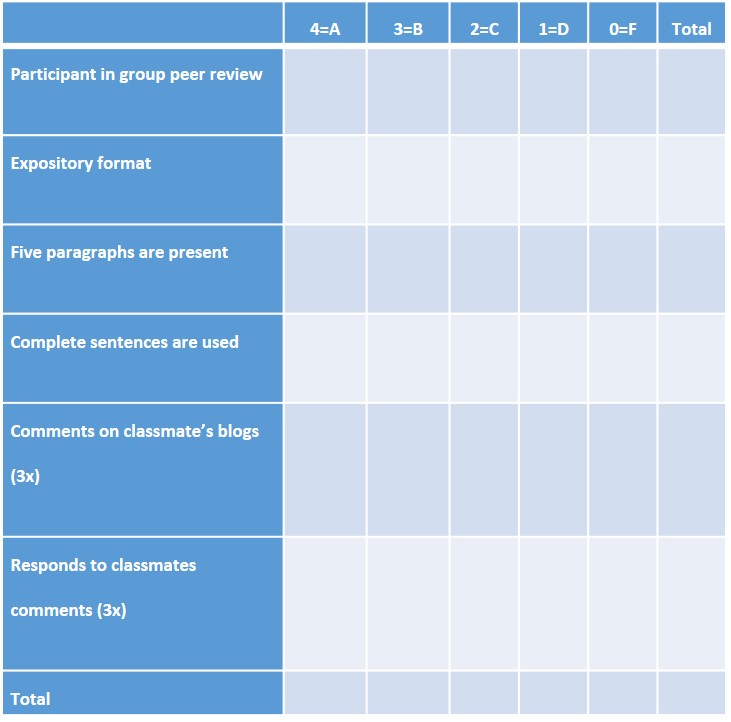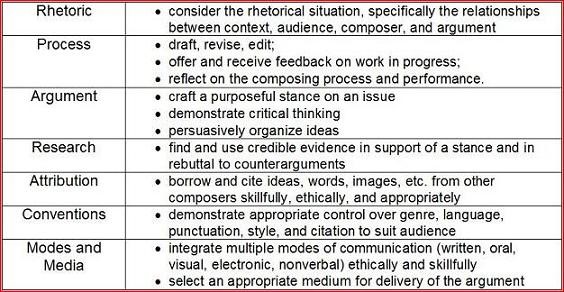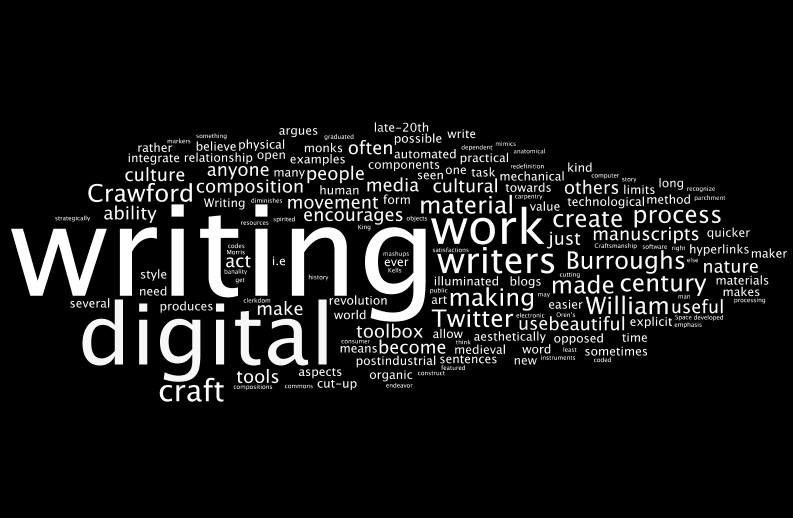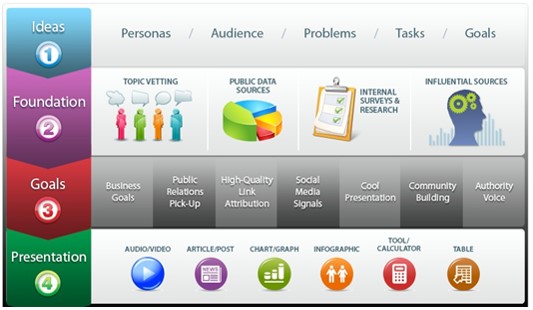Incorporating Digital Media into Teaching Composition
For educators that may have not been so engrossed in the digital media world, this can pose a challenge, especially when most of the young adult students do not know a world without the Internet. My webtext will focus on ideas on how to connect with the student in today’s world when teaching composition.
The typical required five essay assignment in a composition 101 curriculum can still be achieved, but with some tweaks to the approach and plan. The requirements within the assignment will also change so that it incorporates today’s new media society. Due to information so easily available at a touch of a screen, if students do not find the information they are looking for within seven seconds, they move onto the next website, send out a group text, or post their inquiry on social media so that someone else can direct them to the answer. Never in any generation was information or asking for help so immediate when receiving the answer. As educators, we need to work within these parameters, or at least teach students about patience and proper research methods so that their answers are clear, defined, and truthful.
Are college students being taught the proper curriculum for a future career in digital media?
As educators, we are used to adjusting our lesson plans due to time or the pace of the course, but what about changing the delivery method and even some of the assignments to incorporate today’s digitally heavy world. With a background in corporate digital media, many college graduates need to be mentored to fulfill a digital media career but how can they be mentored when the business world expects these recent graduates to be ready to take on the world of digital media.
How as educators do we prepare the students for a future career in digital media?
Teaching Digital Writing in Composition Classes
Digital writing includes communications, emerging media, digital media, multimedia, marketing, content strategy and how to use all these modes to have a well rounded campaign or career.
Bourelle states, “Digital composition, in particular, was an area that students said they are most likely to benefit from in the future. Students who previously had written only academic essays for school assignments became interested in composing in electronic formats in their lives beyond academia. “
Digital Storytelling
Digital storytelling does incorporate digital writing, but how to grab the reader’s attention and keep it requires a mix of different methods. As you observe the type of sites you visit often, reflect on which ones grab your attention, keep your attention and then request that you share with others.
Buzzfeed, Upworthy and Mashable may be a few sites that have defined their storytelling tactic, which draws in millions of users a day. Some of these sites use an argumentative approach to grab the reader’s attention, to gain comments. Through a mix of digital writing, video, visual explanations, technology and trends, these sites and many others have found the right mix of digital storytelling. Although the need for digital storytelling is known, the research methods to gather data to use in the story still remains the same.
Example: Assignment Incorporating Digital Media
Below is an example of an assignment for a First-Year Composition class.
Introduction
In this assignment, the goal for the student is to learn how to publish their work online without the basic grammar mistakes. They will be given help to set up their blog page/site using the content management system of WordPress. Once the essay (blog post) is published, students will be required to respond through the comments to three classmates. The author will need to respond back to their classmates in a smart, respectful, and intelligent approach. This blog will serve as the publishing system to share all their assignments for the semester. This assignment is the first in a series of essays and prompts.
Rationale
The reason for this assignment is for student’s to realize their responsible for what they post online, to be held accountable for their words, and to learn the basic skills of sharing their words, visuals, and ideas in a larger space than just the classroom. Learning how to interact online properly and respectfully, is what builds a portfolio to show future employers that they have experience and the skills for many of today’s jobs.
The typical assignments that are required are five essays in a Composition 101 curriculum. With this lesson of posting an individual’s students writing online, the five essays can still be achieved, but with some tweaks to the approach and plan. The requirements within the assignment will also change so that it incorporates today’s new media society.
Due to information so easily available at a touch of a screen, if students do not find the information they are looking for within seven seconds, they move onto the next website, send out a group text, or post their inquiry on social media so that someone else can direct them to the answer. Never in any generation was information or asking for help so immediate when receiving the answer. As educators, we need to work within these parameters, or at least teach students about patience and proper research methods so that their answers are clear, defined, and truthful.
Assignment
Choose a name for your blog. The topic can be of your choice but must follow the expository essay requirements below.
Some ideas to help you get you started. You can create your own idea and are not required to use any of the below.
- Most people like one particular animal more than others. What is your favorite animal? Why is it your favorite?
- Everyone has days that they will always remember as being very special. Think about a special day that you have had. Write an essay telling why it was so special.
- Rules are important. What are the most important rules at your school and why are they important?
- Explain why it is important to learn to read.
- If you could change places with another person for a whole day, who would you change places with and why would you choose that person?
- We are learning all the time. Some of our learning takes place in school and some outside of school. Write about something you have learned recently and how it has affected you.
- Think of the ideal job for you when you grow up. Now think of reasons why this would be a good job for you. Write an essay to explain why this is your ideal job.
- Imagine that time travel to the past was possible. Think of where and when you would like to go for a visit. Write an essay telling where and when you would go in the past and explain why you choose to go there.
- Imagine that you had no TV, computer, or video games for one week. Think of some activities that you can do instead to keep you busy and out of trouble. Write an essay to explain what you can do to keep occupied in a week of no TV, computer, or video games.
- We all have a place where we can imagine or go where we want to be alone and relax. Think of your favorite place. Now write an essay explaining why this place is your favorite.
- Friends are important, but everyone has a different opinion of what makes a good friend. Explain what, in your opinion makes a good friend.
- Describe a favorite place you have visited. Write 3 – 5 paragraphs or describing the place. Before you begin writing, think about the location of your favorite place. Think about when and why you like to visit this place. Think about the benefits of visiting this place. Now write a description of your favorite place.
This blog post will be an expository essay. Multimedia like visuals, audios, and videos can be used to enhance your side of the argument.
The expository essay is a genre of essay that requires the student to investigate an idea, evaluate evidence, expound on the idea, and set forth an argument concerning that idea in a clear and concise manner. (OWL Purdue University)
The structure of the expository essay is held together by the following. (OWL Purdue University)
- A clear, concise, and defined thesis statement that occurs in the first paragraph of the essay.
It is essential that this thesis statement be appropriately narrowed to follow the guidelines set forth in the assignment. If the student does not master this portion of the essay, it will be quite difficult to compose an effective or persuasive essay.
- Clear and logical transitions between the introduction, body, and conclusion.
Transitions are the mortar that holds the foundation of the essay together. Without logical progression of thought, the reader is unable to follow the essay’s argument, and the structure will collapse.
- Body paragraphs that include evidential support.
Each paragraph should be limited to the exposition of one general idea. This will allow for clarity and direction throughout the essay. What is more, such conciseness creates an ease of readability for one’s audience. It is important to note that each paragraph in the body of the essay must have some logical connection to the thesis statement in the opening paragraph.
- Evidential support (whether factual, logical, statistical, or anecdotal).
Often times, students are required to write expository essays with little or no preparation; therefore, such essays do not typically allow for a great deal of statistical or factual evidence.
- A bit of creativity!
Though creativity and artfulness are not always associated with essay writing, it is an art form nonetheless. Try not to get stuck on the formulaic nature of expository writing at the expense of writing something interesting. Remember, though you may not be crafting the next great novel, you are attempting to leave a lasting impression on the people evaluating your essay.
- A conclusion that does not simply restate the thesis, but readdresses it in light of the evidence provided.
It is at this point of the essay that students will inevitably begin to struggle. This is the portion of the essay that will leave the most immediate impression on the mind of the reader. Therefore, it must be effective and logical. Do not introduce any new information into the conclusion; rather, synthesize and come to a conclusion concerning the information presented in the body of the essay.
A complete argument
Perhaps it is helpful to think of an essay in terms of a conversation or debate with a classmate. If I were to discuss the cause of the Great Depression and its current effect on those who lived through the tumultuous time, there would be a beginning, middle, and end to the conversation. In fact, if I were to end the exposition in the middle of my second point, questions would arise concerning the current effects on those who lived through the Depression. Therefore, the expository essay must be complete, and logically so, leaving no doubt as to its intent or argument.
The five-paragraph Essay
A common method for writing an expository essay is the five-paragraph approach.
- an introductory paragraph
- three evidentiary body paragraphs
- a conclusion
Due Dates
- Setting up of your blog is due on June 20th.
- First draft to share with your peers will be due on June 27th. Please bring copies of your first draft to share with your peer review group and be ready to participate.
- Final draft and ready to publish version on your blog due on July 7th.
- Participation in the commenting of classmate’s blog due July 14th.
- Responding to comments on your blog due July 18th.
I am available to help anyone that would like me to review their essay prior to the final draft.
Rubric (How you will be graded)

Conclusion
My webtext is based on teaching composition students about digital writing and media and how to incorporate these skills into a general composition course. Whether the composition class is online or in a traditional classroom, the experience is a needed skill in how to publish and interact properly online for today’s job market. This is the first assignment in getting the students familiar with posting their words to a larger, public platform and getting accustomed to working online. Of course most students participate in online activities through social media but the transition from “Look what I ate today” pictures on Instagram to actually sharing worthwhile creations of words or multimedia, is what this assignment and my seminar project will be striving for.

Multimodal Approach (source: Jonathan Kotchian, Georgia Tech)
- Create and maintain a blog
- Proper research methods
- Transition from idea to scholarship
- Connecting with influencers
- HARO
- OWL Purdue
- College library
- College Writing Center
Composition Checklist
- Does the essay have a thesis statement and does the conclusion return back to the original statement?
- Besides the written word, are there other multimodals being used throughout the essay?
- Are the sources being used well-researched, academic, scholarship journals?
Sources
Barrett, Helen C. Researching and Evaluating Digital Storytelling as a Deep Learning Tool , The REFLECT Initiative, United States
Bourelle, Andrew. Bourelle, Tiffany. Rankins-Robertson, Sherry, Roen, Duane. Assessing Learning in Redesigned Online First-Year Composition Courses. Digital Writing Assessment and Evaluation. Chapter 12. http://ccdigitalpress.org/dwae/12_bourelle.html. Web.
Brandt, Deborah. The Rise of Writing: Redefining Mass Literacy. Cambridge: Cambridge UP, 2015. Print.
Keller, Daniel. Chasing Literacy: Reading and Writing in an Age of Acceleration. Utah State U, 2014. Print.
Massing, Michael. Digital Journalism: How Good Is It? 2015. Web. http://www.nybooks.com/articles/archives/2015/jun/04/digital-journalism-how-good-is-it/
Selfe, Cynthia L. Multimodal Composition: Resources for Teachers. Cresskill, NJ: Hampton Press, Inc., 2007. Print.
Completed by Lisa Weinberger




